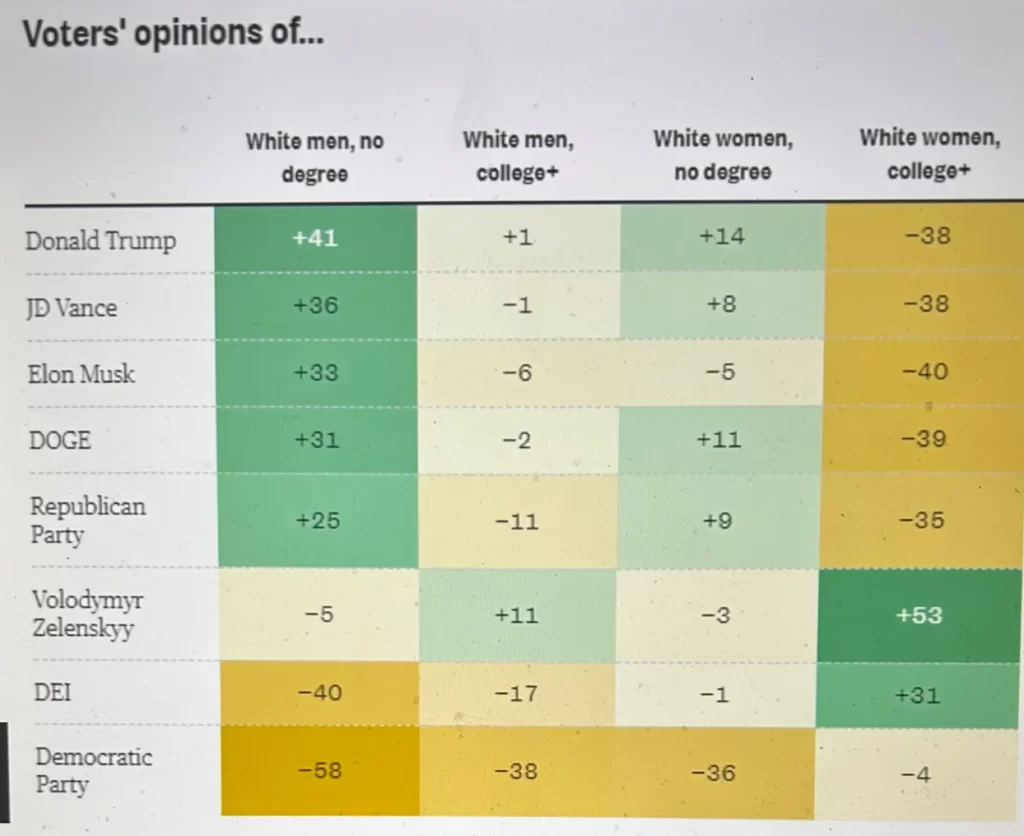MAO
In 1949, Mao Tse-tung proclaimed the People’s Republic of China. He launched his Great Leap Forward campaign that destroyed the agricultural system, causing a famine in which 27 million people starved to death. In 1966, he manufactured a cultural revolution that ordered the closure of schools and sent young intellectuals to the countryside to be re-educated through manual labor. The revolution destroyed much of China’s traditional cultural heritage including books and musical instruments, as well as created economic and social chaos. During this era, Mao’s cult of personality grew to immense proportions.
Love the Uneducated?
During his 2020 victory speech in Nevada, then-president-elect Donald Trump was quoted as saying, “Don’t you just love the poorly educated?” The quote went viral, appearing on t-shirts and bumper stickers. This statement highlights a concerning reality about the relationship between education levels and political manipulation. An NBC opinion poll sheds light on the subject:
- 41% of white men without a college degree supported Trump.
- 1% of white men with a college degree favored him.
- 14% of white women without a degree favored him.
- 28% of white women with a degree opposed him.
- Similar statistics hold for figures like J.D. Vance and Elon Musk.

The reason Trump and others court the uneducated is that they are more susceptible to manipulation and often lack the resources to challenge misinformation. Many of them did not complete high school. As of 2024, 79% of the U.S. population is literate, with 43 million adults considered functionally illiterate. The skill level of 54% of the population is below a 6th-grade level; 20% are below a 5th-grade level. Massachusetts has the highest rate of child literacy, while New Mexico has the lowest. New Hampshire has the highest percentage of literate adults, and California the lowest. The U.S. ranks 36th among nations in literacy—a troubling statistic for a global superpower.
Project 2025 has targeted the Department of Education for elimination, along with cuts to research funding and programs promoting scientific and critical thinking. Historically, dismantling educational institutions and intellectual hubs is a common tactic of authoritarian regimes to consolidate power.
The Department of Education accounts for approximately 4% of the federal budget. Its elimination would negatively impact millions of students, colleges, and universities. Though efforts have been made to weaken the department, it has not yet been entirely dismantled. Federal education funding supports Pell Grants, work-study programs, and student loans. Roughly 28% of its budget is allocated to states, while the remainder supports programs for disadvantaged children from low-income families, students with disabilities, after-school improvement programs, and classroom technology. Contrary to some beliefs, this funding would not simply be transferred to states to use as they see fit. Instead, underfunded schools would suffer even more significant setbacks.
The Republican push to shift education to church-run schools and private equity firms would further exacerbate economic disparities. It would reduce diversity in K-12 classrooms and college dorms while increasing the cost of education, as private entities prioritize profit over equitable access to learning.
Totalitarian governments have historically promoted anti-intellectualism to suppress political dissent. This allows authoritarian leaders to manipulate patriotic fervor, foster intolerance, and spread misinformation unchecked. In communist dictatorships such as Joseph Stalin’s Soviet Union and Mao Zedong’s China, intellectualism was seen as a threat to agrarian communism. Hitler’s Third Reich took anti-intellectualism to a sinister level, banning books, controlling artistic expression, and persecuting intellectual dissenters. General Francisco Franco’s White Terror from 1936-1939 led to the execution of 200,000 critical and creative thinkers. The Cambodian genocide (1975-1979) under Pol Pot nearly eradicated the country’s educated population. Under Trump’s presidency, terms like “fake news” and “alternative facts” became central tools for eroding trust in education and expertise.
Does anyone besides a politician genuinely value the uneducated? While many people without formal education are kind, hardworking, and loving, they are also more vulnerable to misinformation, fear-mongering, and manipulation. Limited access to education often leads to economic hardship, low-paying jobs, and fewer opportunities for upward mobility.
I serve as an “education grandma” to a family whose adults left school after the eighth grade. Their days are spent in low-paying jobs to provide food, clothing, and shelter for the family. Though they love their children, they don’t read to them, assist with homework, review report cards, engage with teachers, or discuss personal or current events. The children have little exposure to cultural or community events and rarely spend time in nature. Because their parent’s vocabulary is limited, so is the children’s. And while love is essential, it alone cannot prepare a child for economic independence and success in America.
I admire this family’s courage in fleeing a repressive regime and their work ethic, yet I also struggle with frustration at their reliance on magical thinking. Their situation fills me with sadness, anger, and determination. My goal is to help their children access the opportunities that will lead to fulfilling lives.
Any government that does not make education a top priority is failing its people. Eliminating the Department of Education would only deepen these struggles, leaving millions more vulnerable to systemic disadvantage. Education is not just a pathway to success—it is a safeguard against exploitation.
References:
The Nevada victory speech video at https://www.facebook.com/watch/?v=10154493986991509
Schueler, B., Lyon, M., Beiberg, J. (2023) Do state takeovers of school districts work? Brookings. https://www.brookings.edu/articles/do-state-takeovers-of-school-districts-work/
Website of National Literacy Institute Literacy Statistics 2024-2025. ( Where awe are now) Retrieved from https://www.thenationalliteracyinstitute.com/post/literacy-statistics-2024-2025-where-we-are-now
WIse, ALana ( 2020) Trump announces Patriotic Education Commission A largely Political Move, NPR. Retrieved from https://www.npr.org/2020/09/17/914127266/trump-announces-patriotic-education-commission-a-largely-political-moveSteves, R.\
Steves, R. ( 2019) The story of Fascism: Hitler’s Anti-Intellectualism. Retrieved from YouTube
Butler, D, Thadani., and others. (2025) Elon Musk’s business empire is built on $38 billion in government funding. The Washington Post. Retrieved from https://www.washingtonpost.com/technology/interactive/2025/elon-musk-business-government-contracts-funding/
I look forward to your comments on my blog site
Art is always for sale. Mao in a 16″ x20″ mixed media painting on canvas. Available for $595, including shipping. Order on my website ot contact me at Marilynne@eichingerfineart.com

Access to clean water cuts to the core of democracy. Access to clean water cuts to the core of democracy. It is being weaponized, pilfered, polluted, traded, and sold at astronomical prices. We need to return water to being a human right and not a commodity.
The Water Factor is a Firebird International Award winner for best dystopian novel and a Literary Titan recipient for best thriller. Though fun to read, it carries a severe message about water scarcity. It is available in ebook, paperback, and audio formats. It can be purchased on AMAZON, Barnes and Noble, and as an audiobook on Amazon, Audible, and iTunes. Ask your bookstore to order a copy from Ingram. Please leave a review on Amazon after reading.

